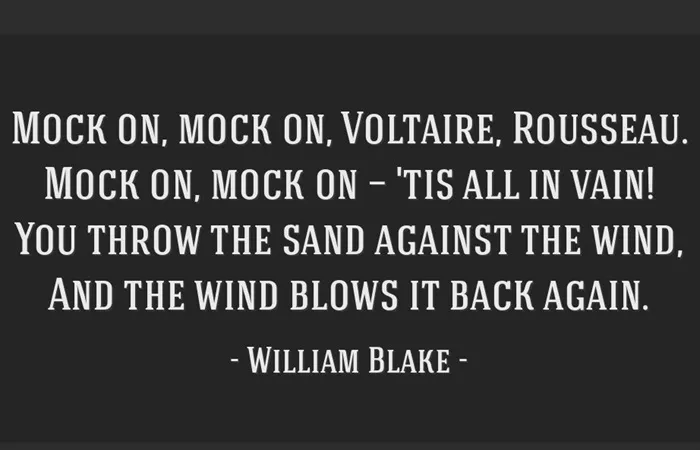Welcome to Poem of the Day – Mock On, Mock On, Voltaire, Rousseau by William Blake
William Blake’s poem, “Mock On, Mock On, Voltaire, Rousseau”, is a passionate and critical work that reflects his distaste for Enlightenment thinkers such as Voltaire and Rousseau. The poem, published in 1794 as part of his collection “Songs of Experience,” is a strong declaration of Blake’s opposition to the rationalist ideals of the time.
Mock On, Mock On, Voltaire, Rousseau Poem
Mock on, mock on, Voltaire, Rousseau;
Mock on, mock on; ’tis all in vain!
You throw the sand against the wind,
And the wind blows it back again.
And every sand becomes a gem
Reflected in the beams divine;
Blown back they blind the mocking eye,
But still in Israel’s paths they shine.
The Atoms of Democritus
And Newton’s Particles of Light
Are sands upon the Red Sea shore,
Where Israel’s tents do shine so bright.
Mock On, Mock On, Voltaire, Rousseau Explanation
Context and Background
During Blake’s lifetime, the Enlightenment period was in full swing, emphasizing reason, science, and the power of human intellect. Philosophers like Voltaire and Rousseau were seen as leaders of this intellectual movement. While these thinkers advocated for progress and social reform, Blake believed their ideas were too focused on human reason and neglected the importance of the spiritual and imaginative realms. In this poem, Blake directly addresses these figures, challenging their views with his characteristic blend of criticism and prophecy.
The Meaning of “Mock On, Mock On, Voltaire, Rousseau”
The opening line, “Mock On, Mock On, Voltaire, Rousseau,” immediately sets the tone for the poem. Blake uses the phrase “mock on” to imply that Voltaire and Rousseau are engaging in an act of mockery, possibly ridiculing spiritual truths in favor of rational thought. Blake’s use of repetition in this line suggests his disdain, emphasizing his frustration with the figures he critiques.
Blake views the Enlightenment philosophers as embodying a limited vision of humanity—one that disregards the importance of imagination, spirit, and divine influence. In his eyes, their mockery of traditional religious and spiritual beliefs leads to a shallow understanding of the world. They represent a vision of life where human intellect is supreme, but Blake argues that such a worldview fails to grasp the deeper truths of existence.
Critique of Rationalism
Blake’s critique is not limited to just the two philosophers but extends to the broader Enlightenment movement. For him, the emphasis on reason and the neglect of imagination is a dangerous path. In the following lines of the poem, he states:
“You throw the sand against the wind,
And the wind blows it back again.”
This metaphor suggests that the efforts of Voltaire and Rousseau, and by extension, the Enlightenment thinkers, are futile. Just as sand thrown into the wind will inevitably be blown back, Blake argues that the rationalist ideals they champion will ultimately fail to bring about true progress or understanding. Their attempts to reduce human existence to mere logic are, according to Blake, destined to fall short.
Spiritual Vision vs. Rational Thought
Blake’s critique of the Enlightenment is rooted in his belief that the spiritual realm is essential to human life. For Blake, the imagination is a divine force that transcends mere reason. While Enlightenment thinkers like Rousseau and Voltaire valued the power of human intellect, Blake contended that it was imagination that provided the key to understanding the universe and human nature.
In the final lines of the poem, Blake challenges the philosophers by stating:
“Mock on, mock on, it will not be long,
Before the soul’s awakening shall come.”
This statement serves as a prophetic vision of spiritual awakening. Blake suggests that despite the philosophers’ efforts to diminish the value of imagination and spirituality, a greater truth will eventually emerge. This awakening, Blake believes, will reveal the limits of human reason and bring forth a more profound understanding of existence.
Conclusion
“Mock On, Mock On, Voltaire, Rousseau” is a powerful expression of Blake’s criticism of Enlightenment thought. Through vivid imagery, metaphors, and a direct challenge to the intellectual figures of the time, Blake reminds us that the human spirit cannot be reduced to reason alone. His call for the return of imagination and spiritual awakening offers a timeless message that resonates even today. By rejecting the cold logic of the Enlightenment, Blake calls for a fuller, more profound vision of human existence—one that embraces both the rational and the imaginative.

